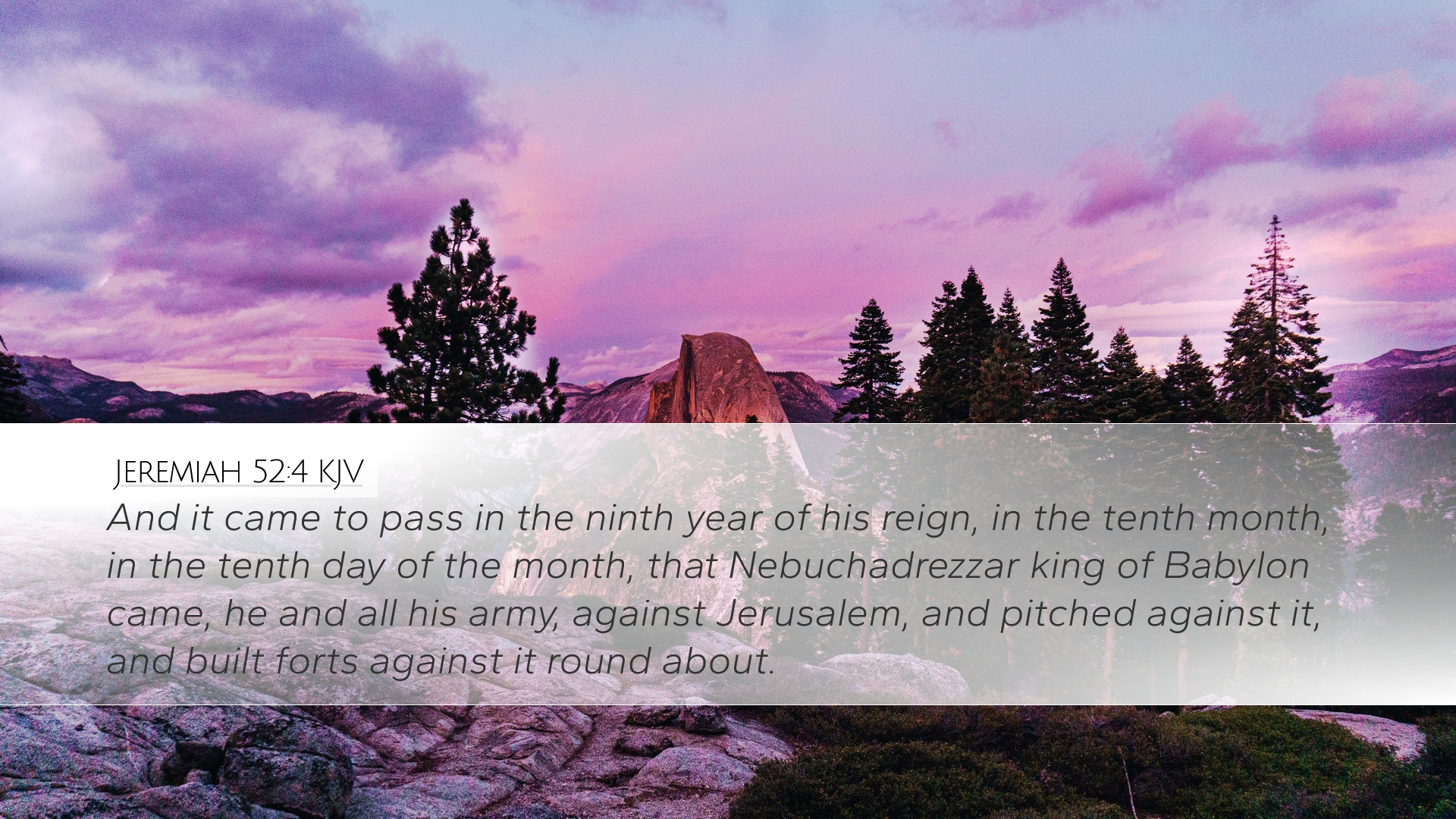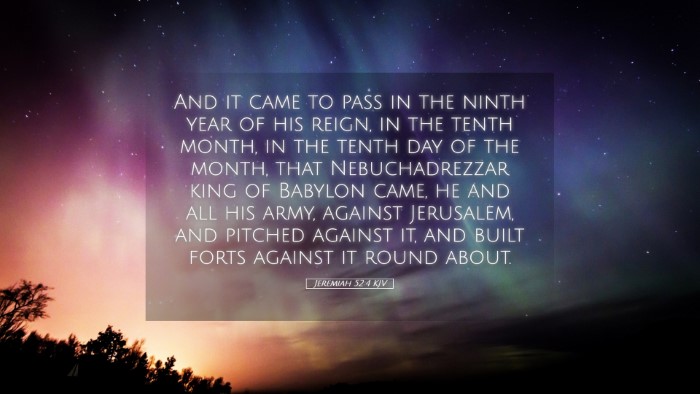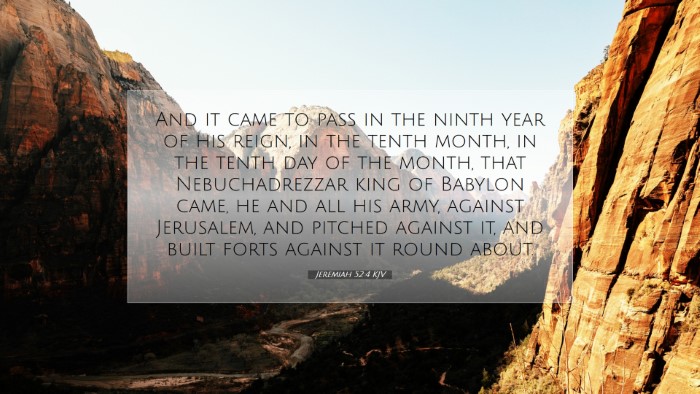Commentary on Jeremiah 52:4
Jeremiah 52:4 states: "And it came to pass in the ninth year of his reign, in the tenth month, in the tenth day of the month, that Nebuchadnezzar king of Babylon came, he, and all his army, against Jerusalem, and pitched against it; and built forts against it round about." This verse marks a significant moment in the biblical narrative, setting the stage for the events leading to the fall of Jerusalem. Below is a detailed commentary that synthesizes insights from various public domain sources including Matthew Henry, Albert Barnes, and Adam Clarke.
Historical Context
The context of this verse is pivotal. It occurs during the siege of Jerusalem by Nebuchadnezzar II, the king of Babylon, which marks a turning point in Israel's history. The prophetic warnings of Jeremiah, who had foretold the captivity due to the people's disobedience, are now realized.
- Matthew Henry: Emphasizes that the date is precise, giving gravity to the event; it signifies the fulfillment of God's judgment upon Jerusalem for its idolatry and apostasy.
- Albert Barnes: Points out that this was a culmination of years of apostasy and the refusal to heed prophetic warnings. The exact dating underscores the historical reliability of the text.
- Adam Clarke: Notes the day of the siege as crucial, illustrating not only a geographical but also a spiritual encirclement of God's people, as they had turned from Him.
The Role of Nebuchadnezzar
Nebuchadnezzar's invasion represents both a military action and a divine instrument of judgment. His role can be understood through the lens of God's sovereignty over historical events.
- Matthew Henry: Suggests that God used Nebuchadnezzar as an agent of His justice, highlighting God's control over even pagan rulers to fulfill His divine purpose.
- Albert Barnes: Stresses that this demonstrates the power of God over nations and rulers, showing that even those who do not acknowledge Him can be used to enact His will.
- Adam Clarke: Discusses the implications of acknowledging Nebuchadnezzar's power, reminding readers that temporal authority must bow to divine authority.
The Significance of the Siege
The siege itself is emblematic of more than just a physical confrontation; it symbolizes a spiritual warfare where the results of sin manifest in national calamity.
- Matthew Henry: Points to the fortifications built against Jerusalem as a representation of the barriers erected by sin between humanity and God.
- Albert Barnes: Notes that the siege serves as a metaphor for spiritual siege; the enemy encircles the hearts blinded by sin, calling for introspection and repentance.
- Adam Clarke: Highlights the importance of understanding this event not just as historical, but as a warning to future generations regarding the consequences of turning away from God.
Theological Implications
The fall of Jerusalem serves as a profound theological lesson, illustrating the nature of God's justice and mercy, along with His willingness to discipline His chosen people.
- Matthew Henry: Reminds readers that God's judgments are not arbitrary but are rooted in justice, urging believers to seek God earnestly to avoid similar fates.
- Albert Barnes: Argues that this event reveals the depth of God's patience, as He allowed the people numerous opportunities to repent before judgment fell.
- Adam Clarke: Emphasizes that understanding this judgment event is crucial for comprehending God's nature—He is both just and merciful, willing to forgive if approached rightly.
Application for Today’s Believers
Believers today can draw several important lessons from the siege of Jerusalem as depicted in Jeremiah 52:4:
- Beware of Apostasy: Like the Israelites, modern believers must guard against straying from God's ways, understanding the consequences of spiritual neglect.
- God's Sovereignty: The realization that God can use even worldly events to fulfill His purposes should encourage believers to trust in His plan during troubling times.
- Call to Repentance: Just as the Israelites had the chance to turn back, contemporary Christians are reminded of the importance of continual repentance and alignment with God's will.
- Encouragement in Trials: The siege of Jerusalem can also serve to remind believers that trials may indicate God's discipline, aimed at restoring a right relationship with Him.
Conclusion
Jeremiah 52:4 is more than a historical account; it encapsulates deep theological truths regarding God's nature, the consequences of sin, and the hope for redemption. The insights gleaned from these public domain commentaries encourage an understanding of Scripture that is rooted in reverence for God's sovereignty and a commitment to His righteousness. As pastors, students, and scholars delve into this verse, may they find both the gravity of judgment and the hope of restoration intertwined in God's eternal plan.


